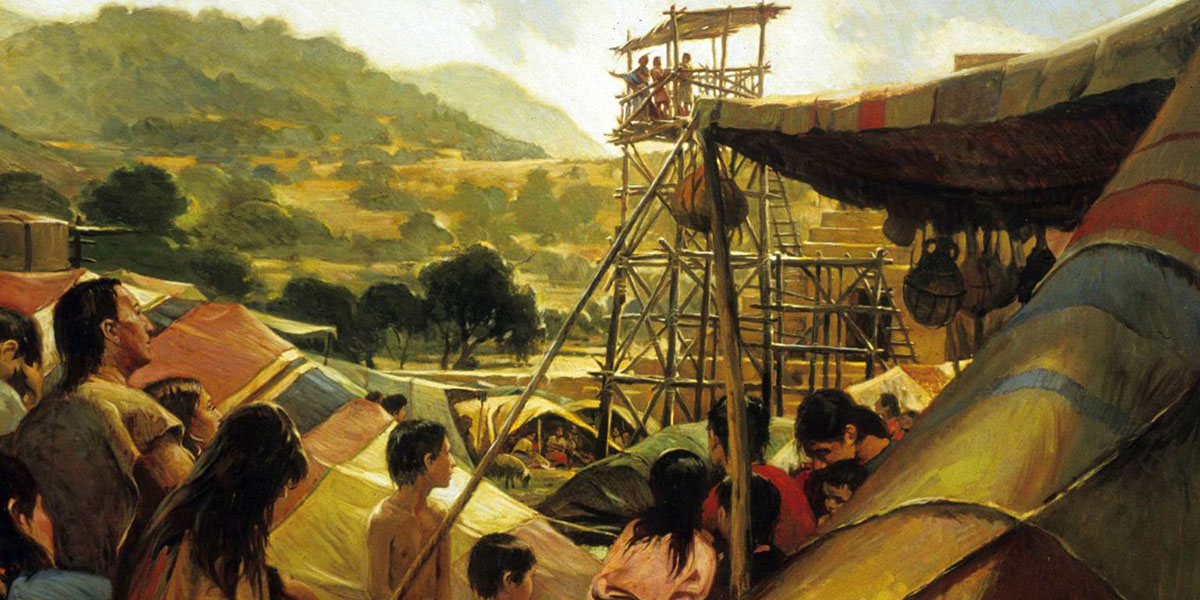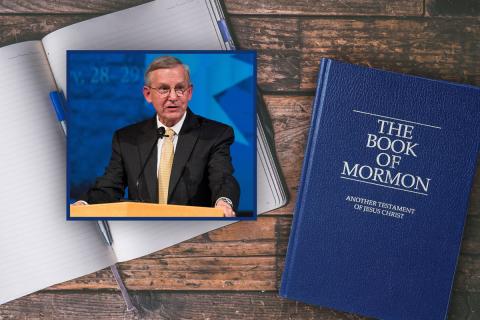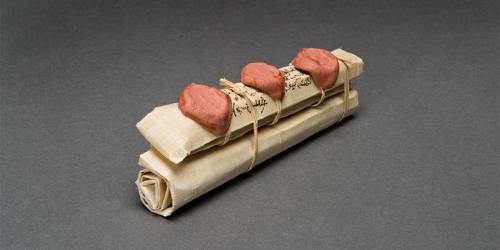You are here
Come Follow Me 2020: Mosiah 4–6

Scripture Block
Mosiah 4–6
April 20–26. “A Mighty Change”
KnoWhys
Recommended Resources
Learn about the Book of Mormon with verse by verse commentaries from renowned Book of Mormon scholars like John W. Welch and Brant A. Gardner in the ScripturePlus app. Read this week's KnoWhy connected with the Come Follow Me curriculum, and watch a video elucidating an insight in this week's scripture reading.
Reading Plan
Structure your personal scripture study by following a multimedia, day by day plan. Each day's assignment includes the required scripture passages from the Come Follow Me curriculum, as well as suggestions for additional resources to bring context and understanding to your study.
Monday
- Scripture: Mosiah 4:1–8
- KnoWhy 82: Why Does King Benjamin Emphasize the Blood of Christ?
- KnoWhy 261: Where Did Joseph Smith Get His Doctrinal Ideas About Christ?
- Chart: King Benjamin's Coronation of Mosiah
Tuesday
- Scripture: Mosiah 4:9–13
- KnoWhy 314: How Did King Benjamin Teach His People to Trust God More?
- Chart: How Did King Benjamin Teach His People to Trust God More?
- KnoWhy 83: Why Did King Benjamin Use Poetic Parallels So Extensively?
Explore Further
Wednesday
- Scripture: Mosiah 4:14–30
- KnoWhy 297: How Can the Book of Mormon Help Saints Live the Law of Consecration?
- Quote: “Helping those who need our help is a characteristic sign of Zion. That is the way people lived in the cities of Enoch and Melchizedek, and it is the way it will be again in the Millennium. There is no reason we cannot start now. In fact, we are commanded to share our temporal possessions with others. Sometimes we refuse to share our possessions with others, however, and rationalize our behavior by arguing that people bring their misery on themselves; they are just suffering the natural consequences of their behavior. Anyone who thinks and acts like that has ‘great cause to repent.’” Ogden, D. Kelly, and Andrew C. Skinner. Verse by Verse: The Book of Mormon, 1:320. Salt Lake City, UT: Deseret Book, 2011.
Thursday
- Scripture: Mosiah 5:1–5
- KnoWhy 307: Why Did King Benjamin Say That His People Would be Sons and Daughters at God’s Right Hand?
- Chart: Treaty–Covenant Pattern in the Old Testament and Benjamin's Speech
- Chart: Covenant Language in the Book of Mormon
Friday
- Scripture: Mosiah 5:6–15
- Quote: “When we become the children of Christ, he becomes our covenant Father, and every week we remember the sacred covenant by taking upon us the name of Christ. We promise to remember him and obey him, thus showing we have truly taken upon us his name; that is, we become Christian, and our behavior is Christlike. We remember to retain his name written always in our hearts. How? By keeping all his commandments: praying, studying the scriptures, fasting, attending meetings, serving, paying tithes and offerings, maintaining healthy bodies, staying morally clean, and following all of his other instructions.” Ogden, D. Kelly, and Andrew C. Skinner. Verse by Verse: The Book of Mormon, 1:322-323. Salt Lake City, UT: Deseret Book, 2011.
- Quote: “Scriptures help us understand that the process of taking upon ourselves the name of Jesus Christ that is commenced in the waters of baptism is continued and enlarged in the house of the Lord. As we stand in the waters of baptism, we look to the temple. As we partake of the sacrament, we look to the temple. We pledge to always remember the Savior and to keep His commandments as preparation to participate in the sacred ordinances of the temple and receive the highest blessings available through the name and by the authority of the Lord Jesus Christ. Thus, in the ordinances of the holy temple we more completely and fully take upon us the name of Jesus Christ.” Bednar, David A. “Honorably Hold a Name and Standing.” General Conference April 2009.
- Quote: “Hebrew seals from before the Babylonian exile (and thus in use during Lehi’s time) provide helpful insight. Many of those seals contain a formulaic inscription reading ‘belonging to,’ followed by the owner’s name. To seal a document or an object, a person would wrap string or twine around it, place a daub of mud on the knot, and press the seal into the mud. Affixing this sort of seal marked the object as the possession of the person in whose name it was sealed.” Gee, John. “Book of Mormon Word Usage: ‘Seal You His.’” Insights 22.1 (2002).
Saturday
- Chiasmus in the Book of Mormon
- Chart: Chiasmus in Mosiah 5:10–12
- Video: The Amazing True Story of How Chiasmus was Discovered in the Book of Mormon (10:16)
- KnoWhy 166: Why Is the Presence of Chiasmus in the Book of Mormon Significant?
Explore Further
- KnoWhy 353: How Was Chiasmus Discovered in the Book of Mormon?
- KnoWhy 343: Can Chiasmus Survive Translation?
Sunday
- Scripture: Mosiah 6:1–7
- Quote: “At the beginning of Benjamin’s assembly, the decision was made not to number the people. The traditional census was not taken. The rationale given for this departure from normal procedure was ‘they had multiplied exceedingly’ and were so great ‘that they did not number them’ (Mosiah 2:2). Of course, they could have numbered them, for they took down all of their names at the end of the ceremony, but for some reason they decided not to number them at that time. Perhaps Benjamin delayed the ‘numbering’ of his people until after the covenant had been made because under the old system, the people would have been ‘numbered’ by tribes and by families, as one encounters, for example, in Numbers 1:17–54. The last thing that Benjamin wanted at this point was for his people to be divided against each other.” Welch, John W. “Democratizing Forces in King Benjamin’s Speech.” Essay. In Pressing Forward with the Book of Mormon: the FARMS Updates of the 1990's, edited by John W. Welch and Melvin J. Thorne, 122. Provo, UT: Foundation for Ancient Research and Mormon Studies, 1999.
- Quote: “Anointing the king with oil is a significant element in the coronation ceremonies in ancient Israel and in the ancient Near East generally.... Following Benjamin's address and the renewal of the covenant by the people, Benjamin ‘consecrated his son Mosiah to be a ruler and a king over his people’ (Mosiah 6:3). The text does not indicate whether this ‘consecration’ included anointing. However, some ritual act was clearly involved. Other instances in Nephite history indicate that the coronation included anointing [see Jacob 1:9]).” Ricks, Stephen D. “The Coronation of Kings.” Essay. In Reexploring the Book of Mormon, edited by John W. Welch, 125. Salt Lake City, UT: Deseret Book Co., 1992.
- KnoWhy 84: Why Were Benjamin and Mosiah Such Beloved and Effective Leaders?
Additional Resources (Bibliography)
Mosiah 4
Baker, LeGrand L., and Stephen D. Ricks. “King Benjamin: The Drama’s Sacral Kingship is about Being a Child of God.” In Who Shall Ascend into the Hill of the Lord?: The Psalms in Israel’s Temple Worship in the Old Testament and in the Book of Mormon, 475–488. 2nd ed. Provo, UT: Eborn Books, 2011.
Mosiah 4:1
Welch, John W., and Greg Welch. “People to Whom Jesus Christ or the Angel of the Lord Appeared.” In Charting the Book of Mormon: Visual Aids for Personal Study and Teaching. Provo, UT: Foundation for Ancient Research and Mormon Studies, 1999, chart 41.
Mosiah 4:1–4
Hopkin, Shon D. “Preparing Students to Receive Revelation: Insights from the Book of Mormon,” Religious Educator 13, no. 2 (2012): 73–87.
Mosiah 4:9–10
Welch, John W., and Greg Welch. “Benjamin's Plea.” In Charting the Book of Mormon: Visual Aids for Personal Study and Teaching. Provo, UT: Foundation for Ancient Research and Mormon Studies, 1999, chart 173.
Mosiah 4:30
Midgley, Louis C. “’O Man, Remember, and Perish Not’ (Mosiah 4:30).” In Reexploring the Book of Mormon, edited by John W. Welch, 127-129. Provo, UT/Salt Lake City: FARMS/Deseret Book, 1992.
Tvedtnes, John A. “The Thoughts and Intents of the Heart.” In The Most Correct Book: Insights from a Book of Mormon Scholar, 170–172. Salt Lake City: Cornerstone Publishing, 1999.
Mosiah 5
Welch John W. “Benjamin's Covenant as a Precursor of the Sacrament Prayers.” In King Benjamin's Speech: “That Ye May Learn Wisdom”, edited by John W. Welch and Stephen D. Ricks, 295-315. Provo, UT: Foundation for Ancient Research and Mormon Studies, 1998.
Mosiah 5:2
Condie, Spencer J. “A Mighty Change of Heart.” Ensign 23, no. 11 (1993): 15–17.
Mosiah 5:7–10
Bowen, Matthew L. “Becoming Sons and Daughters at God’s Right Hand: King Benjamin’s Rhetorical Wordplay on His Own Name.” Journal of the Book of Mormon and Other Restoration Scripture 21, no. 2 (2012): 2-13.
Ray, Brian K. “Adoption and Atonement: Becoming Sons and Daughters of Christ.” Religious Educator 6, no. 3 (2005): 129-136.
Szink, Terry L., and John W. Welch. “On the Right or Left: Benjamin and the Scapegoat.” In Pressing Forward with the Book of Mormon: The FARMS Updates of the 1990s, edited by John W. Welch and Melvin J. Thorne, 107-109. Provo, UT: FARMS, 1999.
Mosiah 5:10–12
Welch, John W., and Greg Welch. “Chiasmus in Mosiah 5:10–12.” In Charting the Book of Mormon: Visual Aids for Personal Study and Teaching. Provo, UT: Foundation for Ancient Research and Mormon Studies, 1999, chart 131.
Welch John W. “Parallelism and Chiasmus in Benjamin's Speech.” In King Benjamin's Speech: “That Ye May Learn Wisdom”, edited by John W. Welch and Stephen D. Ricks, 315-410. Provo, UT: Foundation for Ancient Research and Mormon Studies, 1998.
Welch, John W. “The Discovery of Chiasmus in the Book of Mormon: Forty Years Later.” Journal of Book of Mormon Studies 16, no. 2 (2007): 74–87, 99.
Mosiah 5:15
Gee, John. “Book of Mormon Word Usage: ‘Seal You His.’” Insights: A Window on the Ancient World 22, no. 1 (2002): 4.
Mosiah 6
Mosiah 6:2
Welch, John W. “Democratizing Forces in King Benjamin’s Speech.” In Pressing Forward with the Book of Mormon: The FARMS Updates of the 1990s, edited by John W. Welch and Melvin J. Thorne, 110-126. Provo, UT: FARMS, 1999.
Mosiah 6:6
Welch, John W., and Greg Welch. “How Do You Say "Law" in Hebrew?.” In Charting the Book of Mormon: Visual Aids for Personal Study and Teaching. Provo, UT: Foundation for Ancient Research and Mormon Studies, 1999, chart 119.



